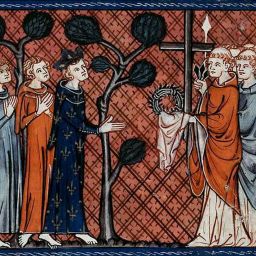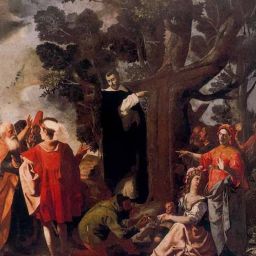
Thematic Issue (Inspiring Faith)
by Sister Jordan Thomas, O.P. ; SAGI Torchbearer & SAGI Advisor, Inspiring Faith
Saint Albert the Great Institute for Science, Faith & Wisdom
St. Fidelis of Sigmarengen
Words of Wisdom: "I came to refute your errors, not to embrace them; I will never renounce Catholic doctrine, which is the truth of all ages, and I fear not death”(1). Such were the words of St. Fidelis shortly before his martyrdom at the hands of the Church's enemies. While his executioners strove to forever silence him by the sword for preaching the Faith, St. Fidelis continues to be a witness to the truths of Christ's one Church by the history of his holy life and death, even centuries after his martyrdom. "Precious in the sight of the Lord is the death of his saints," declares the Psalmist(2), and this is strikingly evident in the deaths of the martyrs who, like St. Fidelis, offered themselves so completely as witnesses to the truth. However, speaking of a holy death in general, many of the saints have remarked that only those who have lived well may reasonably hope to likewise die well. Faithful to God unto death, St. Fidelis understood and lived by the aforementioned truth, and he shows us by his example how imitation of Christ during our lives is the best preparation for our deaths. An exceptional source for learning about saints like St. Fidelis is Reverend Alban Butler's The Lives of the Fathers, Martyrs, and other Principal Saints; thus, it is this work which I have chiefly employed in writing this article.
PHILOSOPHER AND ADVOCATE
Mark Rey, who would later be known as St. Fidelis, was born in Sigmarengen, Germany, during the latter half of the 16th century. As a young man, when he undertook his studies of philosophy and law at the University of Freiburg, he began to be recognized among his peers for his virtuous life, especially for his humility, purity, and spirit of mortification. Filled with fraternal charity, our saint sought not only to live a holy life himself but also earnestly desired the sanctification and edification of his friends. In faithfully imitating the ultimate Exemplar of virtue, Jesus Christ, Rey was a holy example to those who encountered him. Joining prayer with the intellectual life, he became a teacher of philosophy at the University of Freiburg and, eventually, began working as a skilled advocate in law(3).
CAPUCHIN FRIAR AND PREACHER OF THE WORD OF GOD
As careful as our saint was in observing justice in every aspect of his work as an advocate, it is not surprising that he quickly became dismayed with the evil dealings and practices of others in his profession. Author Reverend Alban Butler describes the incidents which became a turning-point in Mark Rey's career: "[T]he injustices of a colleague in protracting lawsuits for gain, and his finding fault with our saint for producing all his proofs for his clients in the beginning, in order to the quicker dispatch, gave him a disgust of a profession which was to many an occasion of sin…"(4). Rey soon resolved to leave his worldly occupation behind and devote himself entirely to the service of God, entering the religious life as a friar of the Order of Capuchins, a branch of the Franciscan Order. At the beginning of his novitiate, his superior chose for him the religious name of Fidelis (Latin for "faithful") –– a meaningful, if not prophetic, allusion to the fidelity to God by which Rey strove to live and which would culminate in his future martyrdom(5). Father Fidelis, who was already known for his great love and generosity for the poor, and having himself embraced a life of poverty as a Capuchin friar, desired that the entirety of his possessions be given to those in need. For example, he bequeathed his inheritance to the poor students of a seminary. It is said that even before he became a friar, his compassion for the poor was such that he did not hesitate to clothe them with his own attire(6) –– a work of charity reminiscent of Our Lord's words: "Amen I say to you, as long as you did it to one of these my least brethren, you did it to me"(7). Having completed his studies of theology, Father Fidelis became superior of the monastery of Weltkirchen. In the surrounding area of this monastery, his preaching and apostolic labors bore much fruit, for he won many souls over to Christ and His Church(8).
MISSIONARY AND MARTYR
Father Fidelis did not remain at the monastery of Weltkirchen. He was sent to Switzerland as a missionary, as the heresies of John Calvin had become widely-accepted among the Swiss people. Father Fidelis was accompanied by several other Capuchin priests whom he prudently directed in their specific missionary duties(9). Father Fidelis knew very well the dangers of the work he was undertaking and the likelihood of his missionary efforts terminating in his martyrdom. However, despite death threats and the indignation of the Calvinists at the arrival of the missionaries, Father Fidelis, ready to sacrifice all for the glory of God and the salvation of souls, went forward courageously to his new mission. His labors were not in vain, for many souls were converted at his preaching –– so many souls, indeed, that the heretics whose hearts were hardened against conversion became outraged with the missionary's constant success, and they came to a resolution to put an end to his holy work. At this point, remarks Rev. Alban Butler, "The holy father . . . thought of nothing but preparing himself for his conflict, passing whole nights in fervent prayer before the blessed sacrament, or before his crucifix, and often prostrate on the ground"(10). On April 24, 1622, being then forty-five years old, Father Fidelis encountered a group of Calvinist soldiers on the road during his travels in Switzerland. Having called him a false prophet, they admonished him to become a Calvinist(11). Faithful to God, and full of fortitude, the saint replied: "I came to refute your errors, not to embrace them; I will l never renounce Catholic doctrine, which is the truth of all ages, and I fear not death"(12) . A soldier then struck Father Fidelis upon the head with a sword, but the holy Capuchin, having fallen, lifted himself to his knees, "and stretching out his arms in the form of a cross, said with a feeble voice: 'Pardon my enemies, O Lord: blinded by passion they know not what they do. Lord Jesus, have pity on me. Mary, mother of Jesus, assist me'"(13). Father Fidelis received his eternal reward shortly thereafter, having been further assailed by the Calvinist soldiers. Three hundred and five miracles have been associated with his intercession, and six months after his death his body was found to be incorrupt.(14)
REFERENCES
1. Rev. Alban Butler, "April 24.––St. Fidelis of Sigmaringen." In Lives of the Saints: With Reflections for Every Day in the Year (New York, Cincinnati, Chicago: Benziger Brothers, 1894), 156.
2. Psalm 115:6 (D-R)
3. Rev. Alban Butler, "April XXIV St. Fidelis, of Sigmarengen, Martyr." In The Lives of the Fathers, Martyrs, and other Principal Saints, Volume IV (New York, P. J. Kenedy and Sons, 1895), 151.
4. Ibid.
5. Ibid.
6. Ibid., 151-152.
7. Luke 25:40
8. Butler, The Lives of the Fathers, Martyrs, and other Principle Saints, Volume IV, 152.
9. Ibid.
10. Ibid.
11. I bid.
12. Butler, Lives of the Saints, 156.
13. Butler, The Lives of the Fathers, Martyrs, and other Principle Saints, Volume IV, 152-153.
14. Ibid.













Great article!